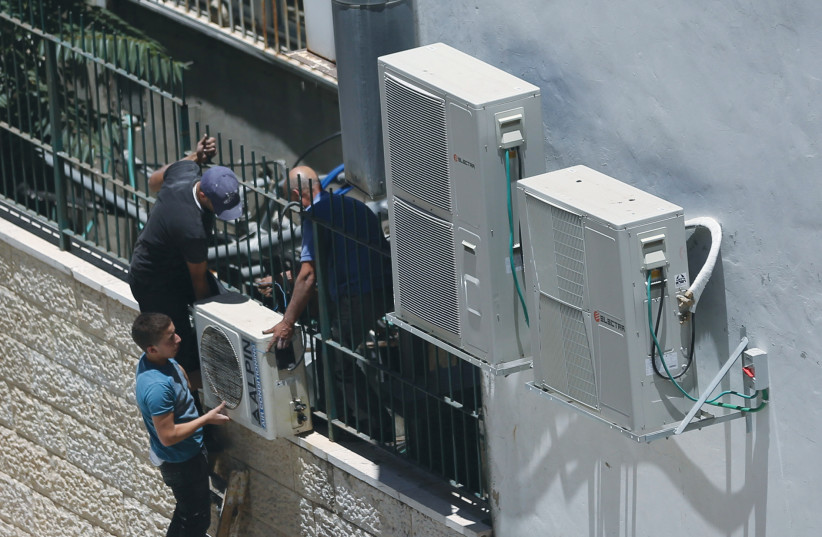With temperatures soaring around the Persian Gulf, steps are being taken to cool things down, including introducing environmentally friendly laws and planting millions of trees.
By HUDHAIFA EBRAHIM/THE MEDIA LINE Published: SEPTEMBER 20, 2023
Business is booming for Suresh, an Indian resident of Bahrain who works in one of the kingdom’s largest air conditioner sales centers.
“There is an increase in the purchase of air conditioners, especially those with a larger cooling capacity and lower energy consumption,” Suresh told The Media Line. “The increase in demand [this summer] amounted to approximately 30% compared to last summer.”
“Gulf steps may mitigate global warming, but they must be faster,”Tariq Al-Khalil, Meteorologist
The spike in sales is an effect of increased temperatures throughout the Persian Gulf, necessitating replacing older air conditioning units with new split air conditioner models. The updated units offer greater cooling power and efficiency in temperatures than can reach nearly 50 degrees Celsius (over 120 degrees Fahrenheit) in summer.
The Bahraini Meteorological Department reported that the average temperature for July this year was 36.6 degrees Celsius (98 degrees Fahrenheit), 1.5 degrees more than the annual July average. It was the second-highest July average since 1902, when temperature records were first kept in Bahrain.
The Bahrain Electricity and Water Authority announced that Thursday, Aug. 3, witnessed the highest consumption of electricity in the history of Bahrain. This record-breaking consumption came despite more than 60,000 Bahraini citizens and many non-citizen residents being out of the country for the summer. Bahrain has a population of some 1.5 million people.

Bahrain is by no means the only Gulf Cooperation Council country to feel the rising heat, with temperatures exceeding 50 degrees Celsius in Kuwait and nearly as hot in parts of Saudi Arabia. This regional spike in temperatures made the annual Hajj to Mecca a sweltering experience for pilgrims.
A report published by the GCC Statistical Center stated that over the past 21 years, the average temperature in the GCC countries has increased by 2.1 degrees Celsius, an increase of 1.1%. The report also revealed that from 2020 to 2021 the Gulf countries experienced a jump in temperature that exceeded the parameters of the Paris Agreement, to which several Gulf countries are signatories.
“The temperature recorded in the Gulf this year is the highest ever,” Ahmed Hamid, a meteorologist specializing in Saudi Arabia weather, told The Media Line. “It is true that the official temperatures may not exceed 50 degrees most of the time, but the real sensation of heat reaches 55 and even 58 degrees Celsius. The reason for feeling [such] high temperatures is the rise in relative humidity, that is, the amount of water vapor. High relative humidity, in addition to already high temperatures, gives a feeling that the temperature is higher than it actually is.”
Fellow meteorologist Ali Al-Hujairi told The Media Line, “Certainly, global warming has a major role in the rise in average temperatures in the Arabian Gulf, especially since the climate has become hotter. But the direct rise in temperature this year is a result of the effect of what is known as a ‘heat dome.’” A heat dome functions like the lid on a cooking pot, occurring when a high-pressure thermal “ceiling” hangs over a region for an extended time, pushing and trapping the warm air close to the ground.
A battle on multiple fronts
The GCC countries are waging a campaign on several fronts to reduce rising regional temperatures.
A report by the Gulf Statistical Center reported that GCC countries have had five laws and regulations on the books since 1997 to protect the environment and resources. Over the past decade, GCC countries have taken several long-term and short-term steps to battle high temperatures and reduce the effects of global warming.
Meteorologist Tariq Al-Khalil told The Media Line that there is little fossil fuel air pollution in the region due to newer vehicles and measures to reduce gas emissions from factories. He commended regional efforts, but said more steps are needed.
“Gulf steps may mitigate global warming, but they must be faster,” he said.
Among the steps are outlawing environmentally harmful refrigerants and replacing them with environmentally friendlier cooling agents, and prohibiting the import of high-energy-consuming or polluting devices. He also said that GCC countries need to enforce existing laws and to establish new laws to protect the environment.
Taking a “green” approach in the battle against global warming and to preserve the environment, several Gulf countries have started large forestation campaigns. In Saudi Arabia, Crown Prince Mohammed bin Salman launched the Middle East Green Initiative, an ambitious program with the goal of planting 50 billion trees throughout the region, 10 billion of them in Saudi Arabia.
Bahrain’s contribution to battling the heat is a program to increase significantly the number of mangrove trees in the kingdom. According to the Bahraini Supreme Council for the Environment, mangroves are the best type of tree for absorbing carbon dioxide. In addition, an annual campaign to plant more than 100,000 trees around the kingdom has been announced.
